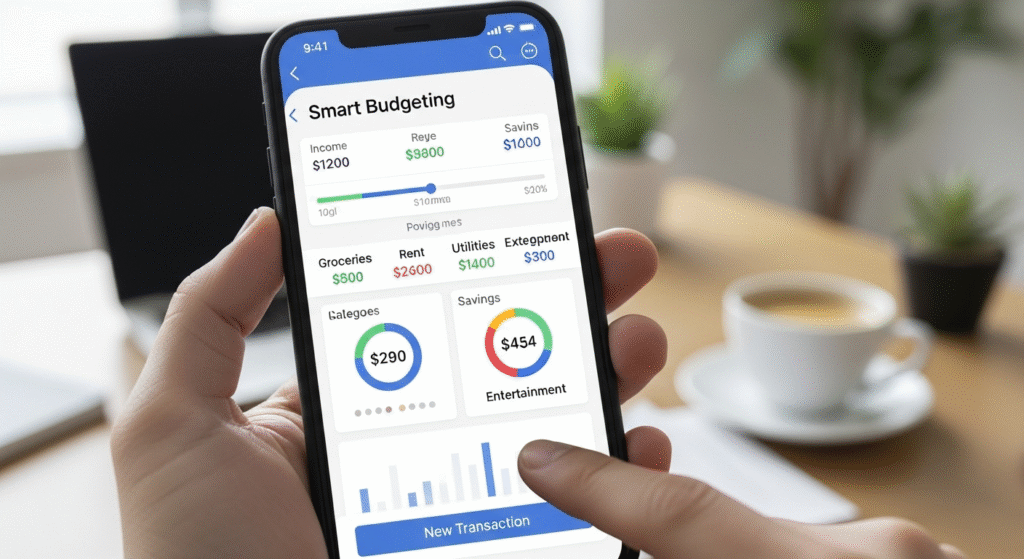
Budgeting for Generation Z and Millennials has become more important than ever in 2025 as financial priorities shift in a fast-changing world. With rising living costs, digital payments, and new investment options, young adults need smarter ways to manage money. Budgeting helps balance spending, saving, and investing while maintaining financial freedom. It also encourages discipline, helping individuals stay prepared for unexpected expenses and future goals. In this guide, we explore how both generations can take control of their finances with simple, effective strategies.
In today’s digital economy, Budgeting for Generation Z and Millennials goes beyond simple money tracking. It’s about using technology, financial apps, and modern tools to make smarter financial decisions. By learning how to save wisely, spend thoughtfully, and invest confidently, both generations can build a stable and secure financial future while adapting to the ever-evolving financial landscape.
Understanding Smart Budgeting

Budgeting for Generation Z and Millennials is more than just tracking income and expenses; it’s about creating a financial plan that supports goals and lifestyle. Smart budgeting means knowing where your money goes and how to make the most of it. It helps individuals prioritize needs, control spending, and plan for the future. By organizing finances effectively, young adults can reduce debt, build savings, and create long-term financial stability.
The key principles of smart budgeting include clarity, consistency, and control. Clarity means understanding your income sources and knowing exactly how much you spend each month. Consistency involves sticking to your plan and reviewing it regularly to ensure you’re on track. Control refers to managing expenses based on priorities and avoiding unnecessary purchases. These principles form the foundation of Budgeting for Generation Z and Millennials, helping them achieve both short-term comfort and long-term goals.
Budgeting also supports financial stability by preventing overspending and promoting smarter decision-making. It ensures that funds are available for emergencies, investments, or major life milestones like buying a car or starting a business. When done right, budgeting builds a safety net that gives peace of mind even in uncertain economic times.
Financial Habits of Generation Z and Millennials

The financial habits of today’s youth reveal how Budgeting for Generation Z and Millennials is evolving with technology and new lifestyle trends. Generation Z is known for being digital-first, relying heavily on apps, mobile banking, and automation. They value speed, convenience, and control over their finances. Millennials, on the other hand, focus on experiences, balancing lifestyle choices with financial responsibility. Both generations are reshaping modern money management with smarter tools and flexible approaches.
Generation Z tends to prioritize saving early. They use fintech platforms and budgeting apps to monitor spending and track progress toward goals. They are more cautious about debt and seek financial education online. Millennials, shaped by past economic challenges, have become more aware of saving and investing for security. However, they also value experiences like travel and dining, which influences their spending patterns. Understanding these differences helps improve Budgeting for Generation Z and Millennials by catering to their unique priorities.
Social media also plays a huge role in shaping financial habits. While it can inspire savings and investment awareness, it can also lead to comparison-based spending. Many people buy items or experiences to keep up with online trends, which may strain their budgets. Inflation and rising living costs further pressure both generations to rethink financial strategies.
Smart Saving Strategies for 2025

In 2025, saving money wisely has become an essential part of Budgeting for Generation Z and Millennials. With growing economic uncertainty, young adults are turning to smart financial tools and techniques to secure their futures. The first step is setting realistic financial goals. This means defining short-term needs such as emergency funds, as well as long-term objectives like home ownership, retirement, or travel. Having clear goals gives direction and motivation to stay consistent.
High-yield savings accounts, digital wallets, and automation tools play a major role in modern saving habits. These options allow users to earn more from their savings and automate deposits to avoid missed contributions. Many Gen Z and Millennial savers rely on online platforms that offer interest-based returns and quick access to funds. Automation ensures that saving becomes a habit rather than a one-time effort, strengthening Budgeting for Generation Z and Millennials over time.
Building an emergency fund is also crucial. Experts recommend saving at least three to six months of expenses to handle unexpected events like job loss or medical bills. Separating short-term and long-term savings ensures that funds for emergencies are always available without disrupting future goals. Smart savers also diversify their methods by using multiple accounts or apps to manage money efficiently.
Smarter Spending Habits
Smart spending is a key part of Budgeting for Generation Z and Millennials. In a world full of advertisements and online shopping temptations, learning to prioritize needs over wants helps maintain financial balance. The best way to start is by identifying essential expenses like rent, groceries, and bills before considering leisure spending. This approach helps prevent overspending and ensures that money is directed toward important goals such as savings or investments. Understanding the difference between short-term desires and long-term priorities is the foundation of smarter financial behavior.
One effective way to stretch money further is by leveraging cashback offers, reward programs, and discounts. Many fintech platforms and credit cards provide cashback or points for daily purchases. By using these wisely, users can save a portion of their spending automatically. Subscribing to loyalty programs or using coupon apps can also reduce costs without cutting back on necessities. Budgeting for Generation Z and Millennials means making the most of every transaction, not avoiding enjoyment altogether.
Managing subscriptions and online purchases is another crucial habit. Many people forget to cancel unused streaming services or memberships, which can drain their budgets over time. Regularly reviewing and adjusting subscriptions can save significant amounts monthly. Setting spending limits for online shopping also prevents impulse buying.
Investing Wisely in the Digital Era
Investing has become an essential part of Budgeting for Generation Z and Millennials, helping them grow wealth beyond traditional savings. In 2025, investment opportunities are more accessible than ever through digital platforms and mobile apps. Beginners can start with small amounts and gradually build diversified portfolios. Understanding basic investment options such as stocks, ETFs, cryptocurrencies, and mutual funds allows young investors to make informed decisions. The goal is to create a balanced plan that supports both financial security and long-term growth.
Generation Z and Millennials are leading the rise of digital investing through robo-advisors and micro-investing apps. These tools make investing simple, automated, and personalized. Robo-advisors use AI to analyze financial goals, risk tolerance, and market conditions to suggest the best investment strategies. Micro-investing apps allow users to invest spare change from daily transactions, making investing effortless. This digital approach aligns perfectly with Budgeting for Generation Z and Millennials, blending technology with financial empowerment.
Balancing risk and diversification is vital in the 2025 market environment. With volatile economic conditions, spreading investments across different asset types helps reduce risk. Regularly reviewing and rebalancing portfolios ensures stability even when markets fluctuate. Gen Z and Millennials must learn that patience and consistency are key to successful investing.
Another major trend shaping Budgeting for Generation Z and Millennials is sustainable and ethical investing. Young investors increasingly prefer companies that support environmental, social, and governance (ESG) values. By choosing ethical investments, they can make a positive impact while achieving financial returns. Smart investing is no longer just about profit, it’s about purpose, responsibility, and long-term financial resilience.
Overcoming Common Budgeting Challenges
Despite having access to financial tools and resources, Budgeting for Generation Z and Millennials still comes with unique challenges. Many young adults struggle with student loans, high rent, and rising living expenses. These factors can make saving and investing seem difficult. The key is to create realistic financial plans that balance obligations with achievable goals. Prioritizing debt repayment, setting limits on spending, and tracking progress can help maintain stability even in tight financial conditions.
Staying consistent with savings goals is another challenge in Budgeting for Generation Z and Millennials. Motivation can fade over time, especially when immediate rewards seem more appealing than future benefits. To stay disciplined, automation is a useful strategy — automatically transferring money into savings or investment accounts ensures progress without constant effort. Celebrating small milestones also keeps financial goals exciting and motivating.
Emotional spending and financial burnout are additional hurdles. Social pressure, online trends, and lifestyle inflation can lead to unnecessary expenses. Learning to separate emotions from spending decisions is crucial. Practicing mindful consumption and budgeting breaks helps prevent financial fatigue.
Financial education also plays a vital role in overcoming these challenges. By understanding interest rates, debt management, and investment basics, young people can make confident financial decisions. Budgeting for Generation Z and Millennials is about building resilience, not avoiding challenges, but learning how to manage them wisely. With the right mindset, every obstacle becomes an opportunity to grow stronger financially.
Tools and Apps for Smart Budgeting
In 2025, technology is revolutionizing Budgeting for Generation Z and Millennials. Digital tools and apps now make it easier to track expenses, automate savings, and monitor progress in real time. These tools simplify financial management by analyzing spending habits and offering personalized advice. From daily budgeting to investment tracking, technology ensures that managing money is both simple and efficient.
Some of the most popular tools include Mint, YNAB (You Need a Budget), and PocketGuard. Mint offers an all-in-one financial dashboard that links accounts, tracks expenses, and provides insights. YNAB focuses on proactive planning, helping users assign every dollar a purpose. PocketGuard automatically categorizes transactions and highlights available spending limits. Comparing these tools helps users choose one that fits their lifestyle and financial goals.
Artificial intelligence and fintech innovations are also transforming Budgeting for Generation Z and Millennials. AI-driven apps can predict spending trends, suggest saving opportunities, and send reminders about upcoming bills. Fintech platforms use automation to invest spare change or transfer money into savings accounts. These features promote consistent financial discipline without requiring manual effort.
Voice assistants, smart notifications, and digital wallets further enhance budgeting efficiency. Users can set goals, check balances, and even pay bills using simple voice commands. The combination of automation, AI, and user-friendly interfaces makes budgeting less stressful and more effective. Budgeting for Generation Z and Millennials has never been more accessible with the right tools; anyone can take control of their finances, achieve goals, and maintain lasting financial health.
Conclusion
Budgeting for Generation Z and Millennials is the foundation of financial independence in 2025. It empowers young adults to save wisely, spend consciously, and invest with confidence. Through smart planning and digital tools, both generations can overcome financial challenges and build lasting security. The journey to financial success starts with awareness and discipline. By embracing smart budgeting habits today, Generation Z and Millennials can create a future filled with stability, growth, and financial freedom where every decision brings them closer to long-term prosperity.
FAQs
How can Generation Z and Millennials start budgeting if they have irregular income?
Starting a budget with irregular income begins by identifying your average monthly earnings and fixed expenses. Prioritize essentials like rent, food, and debt payments first. Set aside a portion of any extra income into savings for slower months. Budgeting for Generation Z and Millennials should also include an emergency fund and expense tracking using apps. Staying flexible and adjusting spending as income changes helps maintain stability even with unpredictable earnings.
What are the best money habits for young adults to build financial discipline?
The best money habits for young adults include tracking expenses, saving consistently, and avoiding impulse spending. Setting financial goals encourages accountability and long-term motivation. Automating savings and using AI-driven budgeting tools also makes discipline easier. For Generation Z and Millennials, financial discipline means balancing enjoyment with responsibility, understanding that small, consistent actions build future wealth. Smart money management today creates lasting security and financial independence tomorrow.
How can budgeting apps help Generation Z and Millennials improve financial planning?
Budgeting apps simplify financial management by organizing spending, tracking savings, and offering real-time insights. Apps like Mint, YNAB, and PocketGuard help Generation Z and Millennials see where money goes and how to improve habits. They send reminders, automate savings, and provide goal-tracking tools. By integrating accounts in one dashboard, users gain a clearer picture of their finances. These apps transform budgeting from a stressful task into an effortless daily routine.
What is the importance of emergency funds for young professionals?
Emergency funds act as a financial safety net for unexpected events like job loss, medical costs, or car repairs. Experts suggest saving at least three to six months of expenses. For Generation Z and Millennials, an emergency fund prevents the need for loans or credit card debt. It offers peace of mind and stability, allowing them to focus on long-term goals without financial stress during uncertain times.
How does social media affect financial habits among Generation Z and Millennials?
Social media greatly influences spending habits by promoting trends, luxury lifestyles, and instant gratification. Many young adults feel pressure to match online appearances, leading to impulsive buying. However, Budgeting for Generation Z and Millennials encourages mindful consumption, recognizing wants versus needs. By following finance-focused creators and learning from educational content, social media can also inspire better money habits. It’s about using digital platforms wisely for growth, not comparison.